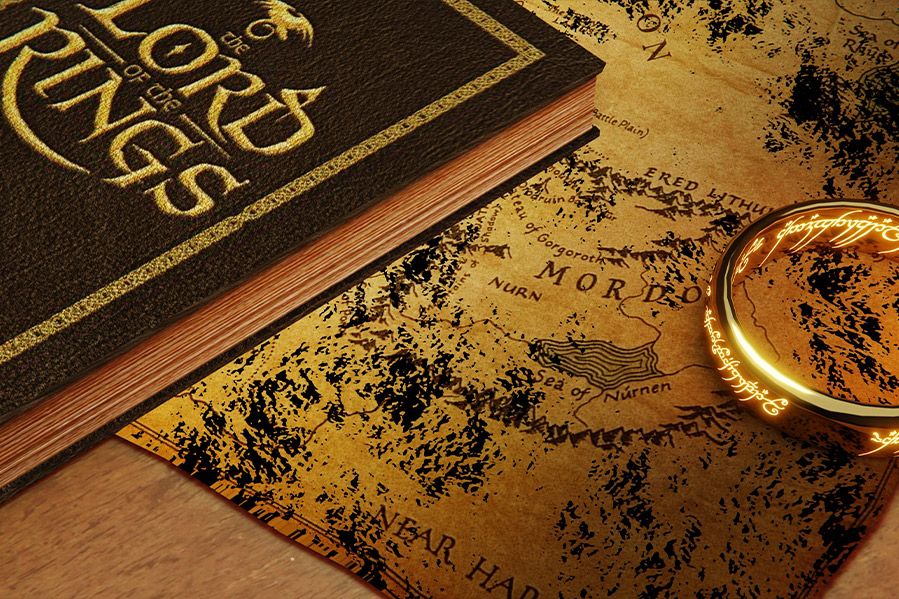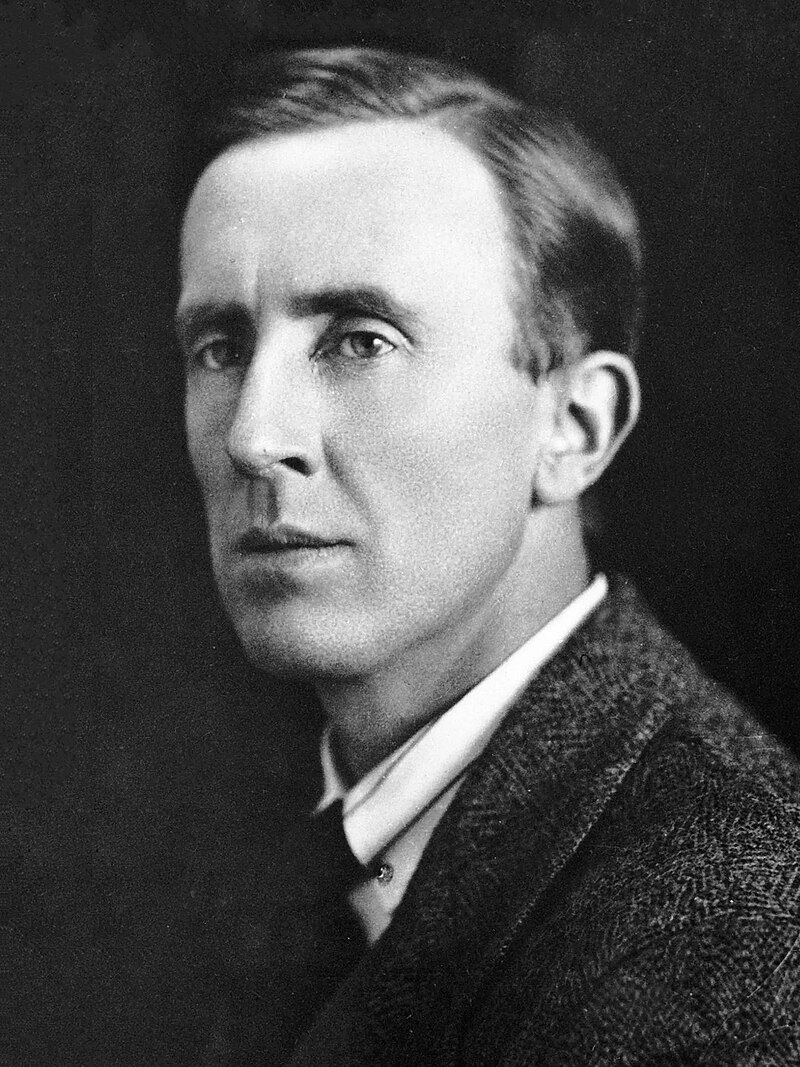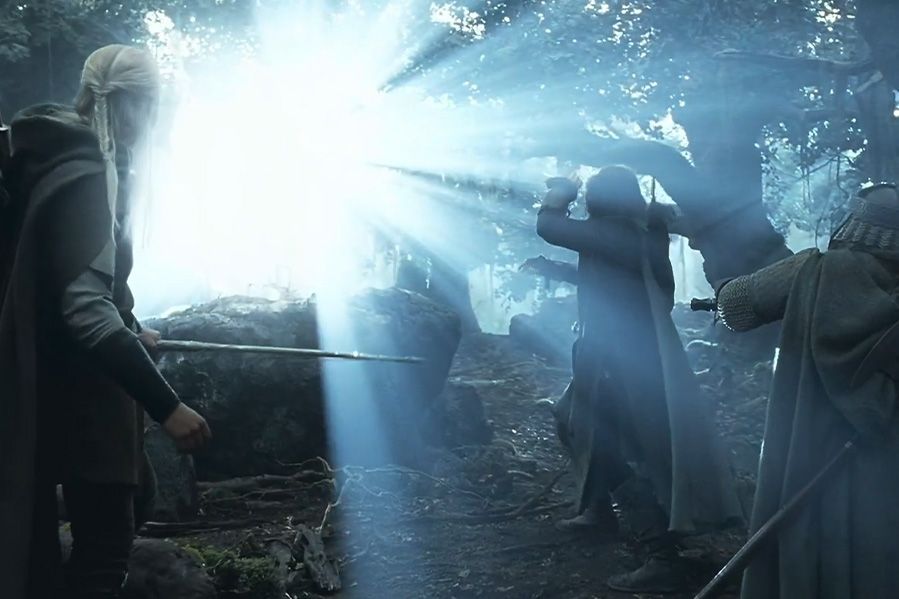
J.R.R. Tolkien’s The Lord of the Rings is often celebrated for its rich mythology, intricate world-building, and timeless themes of heroism and sacrifice.
But there's a case to be made that beneath the surface of Middle-earth’s epic battles and legendary quests, however, lies a deeper layer of meaning rooted in Tolkien’s own Catholic faith.
Think about it: A battle of good and evil, creation myths, and even a resurrected savior… is The Lord of the Rings actually a Catholic work of art, as some fans theorize?
With the debut of the new season of "Rings of Power," we decided to take a look into the religious themes (both implicit and glaring) that shape one of the most popular series of all time.
The Faith of J. R. R. Tolkien

First, let's start with the author himself. There’s no question that J. R. R. Tolkien's Catholic faith and upbringing played a pivotal role in shaping his life and work. Born in 1892, Tolkien was baptized in infancy as an Anglican. But following his father’s death, Tolkien’s mother, Mabel, converted to Catholicism in 1900 – despite facing strong opposition from her family.
Tolkien was confirmed as a Catholic at age 11, and following his mother’s death in 1904, Tolkien and his brother were left in the care of Father Francis Xavier Morgan, a Catholic priest who became a father figure to them.
Tolkien’s Catholic faith remained central throughout his life, influencing both his personal values and his literary works. As a devout Catholic, he attended Mass regularly, insisted his wife Edith convert to Catholicism after marriage, and raised his children in the faith.
Tolkien’s Catholic worldview informed his morals, relationships, and politics. He influenced the conversion of his close friend C. S. Lewis to Christianity, and in his writing, his belief in sacrifice, redemption, and the triumph of good over evil are evident. Tolkien's Catholic faith reportedly provided him with a moral compass and a deep sense of hope, which he believed were essential in both life and art.
Christian Themes in The Lord of the Rings
"The Lord of the Rings is of course a fundamentally religious and Catholic work; unconsciously so at first, but consciously in the revision."
That is how J. R. R. Tolkien described The Lord of the Rings in a letter to his close friend and Jesuit priest Robert Murray. Tolkien famously disliked allegory, but there are nevertheless clear parallels between his beloved fantasy series and Christianity.
Jesus Figures
With a theological reading of the text, the story’s heroes, Frodo, Aragorn, and Gandalf, can all be viewed as representative of some element of Jesus:
- Much like Jesus and the cross, Frodo is burdened by the one ring, which he alone must carry across the vast lands of Middle-earth.
- Aragorn, Gondor’s king-in-waiting, is similar to Jesus and his return to earth in the last days.
- Gandalf is Christ the resurrected, a hero who dies to save the fellowship but who returns to Middle-earth as Gandalf the White to complete his mission.

Lembas Bread as the Eucharist
Lembas, the mystical elven bread which restores vitality in a single bite, can be viewed as a symbol of the Eucharist. As a devout Catholic, Tolkien held the Eucharist close to his heart (he once called it “the one great thing to love on earth”), and it’s possible he modeled the life-giving and restorative properties of the bread – which is at one point described as a wafer – after the Eucharist.
The One Ring = Sin?
Then there's the One Ring, which can be read as a parallel to sin. It's deeply alluring, powerful beyond measure, and incredibly dangerous. No-one is immune to its evil forces; though the honest and stouthearted may resist it for a time, the ring will ultimately corrupt every living being in Middle-earth.
Other Parallels
If we widen our scope, there are clear parallels to Christianity in what is essentially Tolkien’s tome of creation myths, The Silmarillion. Middle-earth has a creator, Eru Iluvatar, and angels, known as Valar. There’s even a devil, Morgoth, who rebels against Eru. Remind you of anyone?
Thematically Catholic, If Not Literally
Tolkien scholars have long debated the extent to which Tolkien overtly infused his faith into The Lord of the Rings. But what isn’t up for debate is how much of The Lord of the Rings reflects his Catholic principles and worldview.
Tolkien insisted throughout his life and writing that elements of the story do not represent anything – that is, Frodo, Gandalf, and everyone else in Middle-earth aren’t symbolic of anyone or anything in the real world. Tolkien would argue strongly that Frodo is Frodo… he isn’t Jesus, nor is he intended to be.
But even if we remove any metaphors or allusions to theology, fans note that the themes and values present in The Lord of the Rings – from Frodo’s mercy to Aragorn’s humility to Sam’s gentle kindness – strongly reflect Tolkien’s Catholicism.
If not in word, certainly in spirit.
35 comments
-
The odd thing is, Tolkien himself said that it was just a story, nothing else. Why people choose to see things that aren’t there is a mystery to me.
-
It is a lovely and timeless saga which anyone may parce to glean their own conclusions. Such is the same with great art. Each individual deems it to be of a meaning based upon their own life experiences. And that is as it should be.
-
The same applies to Star Wars as well. If you choose to see it in a religious light, you will see it in a religious light.
-
I think it is very probable that LOTR has many hidden Catholic meanings. If I were to formulate my own theory about this, I would venture that this story was about the Immaculate Conception. The Lord was probably a bishop, or the angel that came to Mary in Luke 1:31, telling her that she shall "conceive in her womb and bring forth a Son, and shall call His name Jesus." If this is the case, then the ring would represent a hymen, or the fact that Mary was a virgin before she was visited by him and that the sin represented by the ring would be rape.
-
It always amazes me how some look for the hidden meaning in everything. Tolkien wrote Science Fiction Fantasy. He became the pioneer shaping the genre. Of course writers draw from their backgrounds when they pen their literature to paper. However, it's simply fantasy, a work of art yes but still, just the creation of an artist's imagination.
-
Not Catholic necessarily but Christian yes. Satanic musicians plug Satan into their music, communist orators plug communism into their oration and murderous authors plug murder into their writings.
We are that which we gaze upon. It's no surprise that someone who believes in a creator, namely Jesus The Christ, would include our Lord into his work.
I've heard it said that work which includes our Lord's message is long living. Indeed that's true here. Even now people are just discovering that it's written in the redemptive nature of Christianity and her King of Kings faced against belligerent evil with the endless thirst for corruption all things good.
The hobbits being the weakest of the weak destroy the most powerful of enemies. So this is true with God's creature Man. The weakest of spiritual creations destroys Satan. The son of man destroys Satan. How beautiful and remarkable. How noble and humble.
On the approach of 100 years the story is proving itself to be timeless.
-
100 years is not timeless. generational...maybe
the iliad and the odyssey timeless
horace's satires are timeless
-
-
Its a movie for crying out loud. Nothing more. You can find the same thing if you read Dracula by Stoker or the ancient Greek myths. Not everything borders on religion or even religious themes.
-
It was actually a book trilogy first...
-
-
I don’t understand our need to compare stories of good and evil to the bible. I’ve read all the books and seen all the movies, but never thought to read anything religious into them. Sometimes a book is just a book.
-
I didn't see anything that was specifically Catholic in the article. The examples given are universal Christian themes.
-
Agreed.
-
-
Najah Tamargo-USA
I read them, and saw most of the movies. Can't someone just write a good fantasy series???? Not EVERYTHING has to be attached to :religion."
-
As a retired English professor, I agree with you. Sometimes a stick is just a stick…
-
-
At least Tolkien's mental illness was never an impediment to living his life and he was able to funnel it into something he could make money from. But it must be difficult to live a life that was so damaged and corrupted as a youth as to never be able to shake off the influence and be able to heal from the damage inflicted on him by the cathaholic church and its minions.
Either that or it's nothing more than a written version of Rorschach Blots in which people can see/read anything they want and it's all a reflection of their own inner workings and demons.
Or possible it's yet one more in a series of clickybait blogs to drum up activity here. Fortunately there are a few that appear to be here as their full time job (well, that and judging others)
-
Rev. Dr. Father JJ, I am disappointed that you disparage the Catholic Church in such a fashion ("...damage inflicted on him by the cathaholic church and its minions.") The discussion of Tolkien is simply an academic exercise. How we practice faith or don't practice is a matter of personal preference. Respect for all is a value we should all be practicing. As the quote goes, "We are all children of the same universe?" Unfortunately, such Bigotry and Prejudice is systemic in our society. I suggest you might strive to emulate the values embodied within that quote. It would go a long way to eradicate the polarization currently experienced by way too many. Faith is not them or us, right or wrong, black and white. It is a system of beliefs without tangible proofs to validate that system. We all have an inherent right to our own beliefs. Tolerance and acceptance is what makes our world a better place.
-
sorry to disappoint you tommy but I am just expressing my opinion, my take on how religion adversely affects people, especially young, impressionable children.
and again, sorry to disappoint but the cathaholic chuurch holds no special meaning or reverence to me, nor does any chuurc or religion.
my attitude here is to push back against all that are here with the goal of pushing not just their religious beliefs but while doing so demean others. maybe go out and finger point at the ones who continue to espouse anti-atheist, or anti-satanism or any other belief or religion THEY do not believe in or approve.
a discussion of tolken is appropriate to posit that if there is any religious innuendo in his writing that I believe it's a result of his being poisoned as a child by the chuurch. if you disagree fine but don't go and try to make it out like I'm anti-ULC, I am all about ULC and its "...all children..." etc, sadly it's the few others that come in here and try to denigrate non-their beliefs.
-
-
On the contrary, Tolkien was involved with his children, creating mini stories to tell them. One character from such a mini story, Tom Bombadil was incorporated into the Lord of the Rings book. It's a joy to know you've got a creator that loves you.
Some people think happiness is a mental illness, others think it's happiness.
-
Ahh, a fairytale apologist.
-
Ahh, a fairytale apologist.
-
your comment is a non sequitur.
happiness is a natural state. don't confuse it with mental illness as a result of religion and faith, that kind of happiness is a mental illness
I guess science, knowledge and facts aren't as satisfying to love and worship as imaginary beings and pretend clown goDs
-
I'm not sure why anyone would worship at tool JJ but they do. Science is like a wrench, you turn it when you need to turn it. It must take a simple mind to miss that, hence all the science worshipers running around preaching "Let's put Science in Her rightful place".
I know of a gal that worships plants but just certain ones. Never could figure out why all plants don't deserve worshipping but she's got it figured out I guess.
Concerning facts, it seems the modern educated man is having a tough time nailing down what a woman is. Nobody seems to have trouble figuring out what a man is though. Oddly, the more science they pour into the debate, the more confused they get. I'm guessing one day soon they'll say women just don't exist and show the science to prove it.
-
-
-
-
Masterpiece! Great analogy! It can be view more as the concepts of well rounded Christian Faith verses just Catholic. Worth the mention. I wonder if the sequel will be even better.
-
Story telling one-0-one. The journey, the prize, the sacrifice, battling good and evil, while resisting temptation. All these stories are as ancient as people. Written down from Homer, Arabian Nights, King Arthur, all the same plot. Bible and Quran follow the same pattern. So why does Catholic church get to claim originality?
-
Great question!
-
My thoughts also. It is Ancient Storytelling. Before even Christians. That is why All stories carry messages. These "stories" are not just Tolkien's', they are tales passed down around campfires. Not meant to "teach us" Christianity. Simply meant to show us how to become better Humans. So interesting to me that a "religious" web site like this would show us who and what Religion has done to us humans. I loved these stories as a child. I love these stories now. The stories will live on, as long as there are humans to share them. OG Steve Two Spirit Minister Reiki Student
-
-
Such a wonderful article! I'd never read the books but did see, I think, two of the movies and never made the connections. They say that we should write what we know, and it sounds like that's exactly what he did.
-
And the problem here is? Any writer is going to base his or her works on their beliefs. As does the reader when reading something. Take Tolkeins works at face value, the battle of good vs evil. At no point when reading the books did I pause and say - oh a Catholic thing! I doubt many others did either.
So, other than filling up space what is the purpose of this article?
-
When Gandolf was in the underworld for 3 days after defeating the beast then raised as a being of white light, Jesus came to mind.
-
As I said, we all bring our own views or beliefs to what we read. I also said that I personally did not read any of that into the books.
-
Comment removed by user.
-
Interesting. Just out of curiosity, where did you get that it was 3 days?
-
Mitch, it was after he fought against the Balrog. The actual fight was several days long while he pursued the beast. After defeating the balrog he also died and was dead for 3-4 days or so. Then resurrected as gandolf the white where he described each day of death as being as long as a lifetime.
I read the book before I read the Bible and always thought that sounded like what I heard about Jesus. The character of gandolf is an extremely gentle and joyful person with the will to be serious and ferocious when needed. His image of disciplined patience and power aligns with that of Jesus.
-
Why did ou remove your first comment btch, I’m sry I meant MITCH(with a b). You are looking for trouble going around acting Ike that. Remember Sadie tan is always watching. 😏
always watching
watch yourself
think before you speak
i am your worst nightmare
bye bye Mitch
-
-
-
-
Well, fiction usually draws on other fictitious works to flesh out a story. Using references to familiar fictional works to draw an audience in with a sense of familiarity. This is neither new nor a ground shaking revelation.


You can pretty much find religion in anything if you apply the religion.